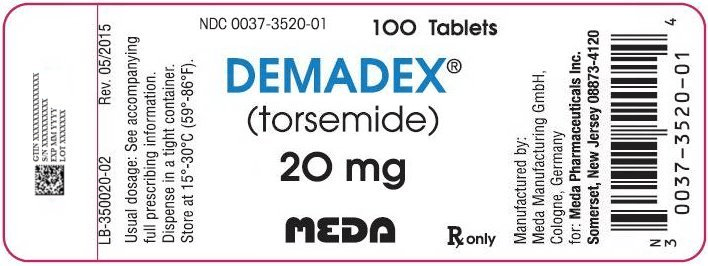Demadex


A loop diuretic (water pill), Demadex (torsemide), stops your body from absorbing too much salt. This enables the salt to be eliminated through urine.
Demadex is prescribed to people with congestive heart failure, liver disease, or kidney disease to treat fluid retention (edema).
The use of Demadex is not limited to those conditions detailed in this medication guide.
Demadex is a diuretic drug used to treat edema and fluid retention. The medication functions by keeping the body from absorbing an excessive amount of salt, allowing the salt to be excreted in the urine. This aids in lowering the body's water retention and in reducing swelling and congestion.
Demadex has a wide range of potential health advantages because it can help with kidney disease, liver disease, and heart failure. The medication can also aid in lowering blood pressure and relieving fluid retention symptoms.
Demadex may cause side effects, just like any medication. The most frequent side effects are headaches, lightheadedness, and dizziness. An upset stomach, diarrhea, and constipation are possible additional side effects.
Before beginning Demadex, it's important to discuss any possible side effects with your doctor. Contact your doctor as soon as possible if you experience any negative side effects that are severe or bothersome.
Demadex is offered as a tablet. 20 mg to 40 mg once daily is the customary starting dosage. Depending on how a person reacts to the medication, the dosage may be increased or decreased.
Demadex must be taken exactly as directed by your doctor. Demadex should not be taken in excess or insufficiently, nor should it be stopped abruptly without first consulting your doctor.
Take the missed Demadex dose as soon as you remember it if you forget to take it. Skip the missed dose and carry on with your regular schedule if it is almost time for your next dose. Never take two Demadex doses at the same time.
Before beginning treatment, it's important to discuss all prescription and over-the-counter medications you're taking with your doctor because Demadex may interact with them.
Lithium, digoxin, ACE inhibitors, and other diuretics are a few of the medications that may interact with Demadex. These are just a few examples of possible drug interactions, so before beginning Demadex, be sure to discuss all medications you are currently taking with your doctor.
Demadex functions by limiting the amount of salt that the body can absorb. This enables the salt to be eliminated through urine. Additionally, the medication lowers blood pressure and eases fluid retention symptoms.
Demadex's exact mode of action is unknown, but it's generally accepted that the medication prevents the kidneys from reabsorbing sodium and chloride. This lessens swelling and water retention.
Demadex's pharmacokinetics have not been thoroughly investigated. The medication has a half-life of 6 to 8 hours and is thought to be well absorbed from the gastrointestinal tract.
Demadex is mainly eliminated through the kidneys, so before beginning treatment, it's important to discuss any kidney issues with your doctor.
Demadex has a wide range of substitute drugs. Other diuretics like furosemide and spironolactone are among these.
Before selecting a course of treatment, consult your doctor about all available options.
Several clinical trials have been conducted to assess the effectiveness and safety of Demadex. Demadex has been proven to be successful in reducing fluid retention and improving symptoms in congestive heart failure patients in a 12-week, randomized, double-blind, placebo-controlled trial.
Demadex was demonstrated to be efficient in lowering ascites in another 12-week study involving patients with liver disease. The medication was well tolerated in both studies, with headache, dizziness, and lightheadedness being the most frequent side effects.
Children with nephrotic syndrome have also been studied in relation to demadex. Demadex was demonstrated to be efficient in reducing proteinuria in a small clinical trial.










Plus get the inside scoop on our latest content and updates in our monthly newsletter.